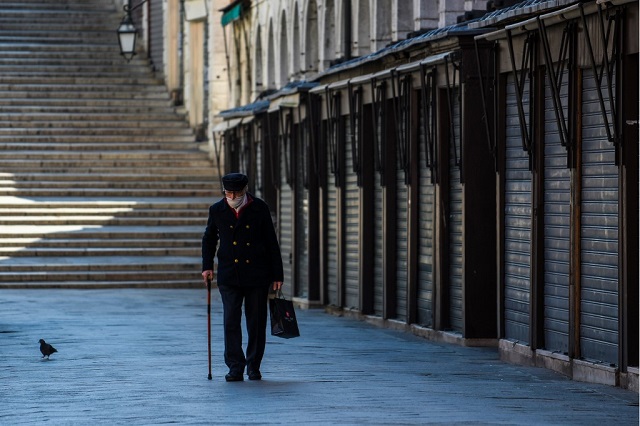Too poor to stay in? State responses to COVID-19 cannot ignore people’s economic realities Special Report
Features, New in Ceasefire, Special Reports - Posted on Sunday, March 22, 2020 20:38 - 0 Comments

A man wearing a face mask walks across a deserted street in Venice on March 18, 2020, during the country’s lockdown within the new coronavirus crisis. (Photo by ANDREA PATTARO / AFP)
Over the past week, we all have seen a dramatic escalation of cases of coronavirus (COVID-19) across the globe. As of March 22, there were more than 314,000 cases and 13,500 deaths confirmed globally. Of these, 53,578 cases and 4,825 deaths were confirmed in Italy alone, the most affected country in Europe and the one reporting the highest death rate worldwide. 793 people died of COVID-19 in Italy just this Saturday (March 21).
While the UK government has been criticized for lacking a solid plan to keep the UK public safe, and for not announcing the closure of schools and social venues until March 20, after weeks of opposition to the idea, many European countries have imposed drastic social distancing measures to limit the spread of, and damage caused by, the coronavirus. These measures include state of emergencies, quarantines, travel bans and restrictions, to name a few.
On March 10 Italy became the first country in Europe to lock down its 60-million population until March 25 and — following a recent announcement by its Prime Minister — now until April 3. This means no more operating factories and businesses unless strategic to the provision of primary goods and services. No more sporting events. No more schools and universities. No more cinemas, theatres and nightclubs. No more religious celebrations, including funerals for those dying because of the virus. No more just going out for a walk to take some fresh air. No more public gatherings. People are only allowed to go to the chemist , to the grocery store or to work (unless they can work remotely), and need to carry with them a document explaining their reasons for doing so. Police officers are monitoring the streets. Those caught outside with no valid reason risk monetary penalties, while those caught outside with symptoms risk prison sentences of up to 12 years.
As Spain, France, Germany, Belgium and many others have followed suit with similar lockdowns, human rights experts warn that these measures may infringe on a number of human rights, and particularly the right to work and earn a living.
In a statement on March 16, Amnesty International said that the measures taken by countries to protect public health in the wake of the current pandemic must not put people at risk of losing their jobs or wages because they cannot go to work. These measures must not make the payment of bills, rent or mortgages impossible.
This is particularly important for those who cannot simply “work from home”: those in insecure forms of labour, the self-employed, casual and gig workers, migrant workers, people on low incomes, ‘irregular’ migrants and people working in the informal sector — all of whom often do not get sick pay, parental leave, health care or other forms of social security benefits. This is also important for the sick or quarantined, and those caring for children because of school closures.
Protecting the health of the public must remain the top priority but emergency measures should not make people vulnerable to destitution; or put those already living in poverty at further risk. Without guarantees that these measures will not have adverse consequences to themselves and their families, people may feel they have no option but to defy the virus and disregard the public health initiatives governments are putting in place.
As warned by the International Labour Organization this week, not protecting people from jobs and income loss will also inevitably have a negative, ripple effect on the demand for goods and services, damaging all businesses regardless of their size.
Some countries are realizing that. On March 16, Italy adopted an emergency decree which temporarily introduces tax breaks and waivers for social security contributions, suspends loan and mortgage repayments for companies and families, increases funds to help firms pay those unable to work due to the lockdown, extends parental leave and offers funds to those who are self-employed and to families to pay for child care. On March 17, Spain announced a moratorium on mortgage payments and support for self-employed workers who are losing business because of the coronavirus crisis, as well as a halt to evictions and the guarantee of water, electricity and internet to vulnerable households.
While these packages are welcome news to the thousands impacted by the virus, in the long run, thorough institutional and policy reforms are needed to rebuild social security systems which can stimulate the economy and labour demand as well as strengthen societies, ahead of future crisis.
The packages are also likely to increase Italy and Spain’s budget deficits. As many in lockdown are supporting each other, not only by staying in to protect those most at risk from falling seriously ill, but also by taking to their balconies to applaud health care workers or to sing and play music, it is important that countries that have been severely affected by the virus will receive support and international solidarity as they rebuild their health systems and economies.



Leave a Reply